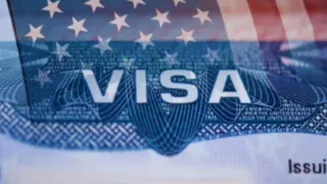In a significant development, the US Embassy in New Delhi has announced that it has revoked and denied visas of some Indian business executives and corporate leaders who are allegedly involved in the trafficking
of fentanyl precursors.
In a press statement, the US Embassy in India stated that the decision has been taken in furtherance to the Trump Administration’s efforts to keep Americans safe from dangerous synthetic narcotics.
“The U.S. Embassy in New Delhi remains steadfast in its commitment to combating illicit drug trafficking. Individuals and organizations involved in the illegal production and trafficking of drugs to the United States, along with their families, will face consequences that may include being denied access to the United States,” Chargé d’affaires Jorgan Andrews said.
Stopping the flow of fentanyl and its precursors into the United States is one of our highest priorities. We have revoked visas for company executives and family for the unlawful involvement in controlled substance trafficking, including fentanyl. Those who facilitate the flow of… pic.twitter.com/atWupz7WLG
— U.S. Embassy India (@USAndIndia) September 18, 2025
It further said that the actions have been taken pursuant to section 221(i), section 212(a)(2)(C), and 214(b) of the Immigration and Nationality Act.
Executives of companies known to have trafficked fentanyl precursors will also be flagged by the Embassy when they apply for visas to the US.
Drawing attention to the threat of fentanyl and illicit drug trafficking, the US embassy also thanked the Indian government for its cooperation to combat it.
Earlier today, US President Donald Trump named 23 countries, including China, Afghanistan, India, and Pakistan, as the major drug transit or major illicit drug-producing countries in a ‘Presidential Determination’ submitted to Congress.
In the determination, the US President warned that the production and trafficking of narcotics and precursor chemicals from these countries threatens the safety of the United States and its citizens.
Trump further singled out five nations — Afghanistan, Bolivia, Burma, Colombia and Venezuela — as having “failed demonstrably” over the past 12 months to uphold international counternarcotics obligations.
It reasoned that the countries are placed on the list on “the combination of geographic, commercial, and economic factors that allow drugs or precursor chemicals to be transited or produced, even if a government has engaged in robust and diligent narcotics control and law enforcement measures.”














